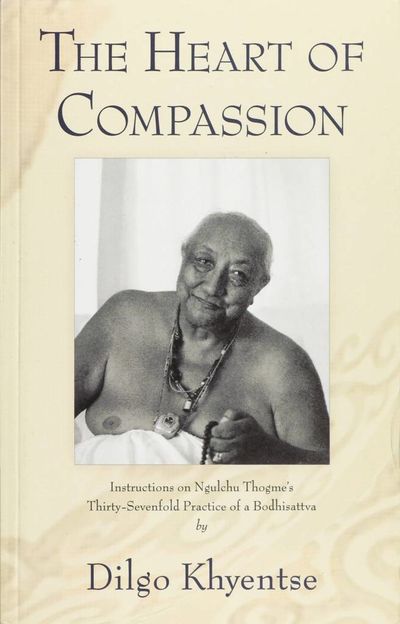No edit summary |
No edit summary |
||
| Line 56: | Line 56: | ||
****** {{i|E. Transcendent concentration|148}} | ****** {{i|E. Transcendent concentration|148}} | ||
****** {{i|F. Transcendent wisdom|152}} | ****** {{i|F. Transcendent wisdom|152}} | ||
II. Training in the Four Instructions taught in the Sutra 157 | ***** {{i|II. Training in the Four Instructions taught in the Sutra|157}} | ||
A. To examine oneselffor one's own defects and to give them up 157 | ****** {{i|A. To examine oneselffor one's own defects and to give them up |157}} | ||
B. To give up speaking of a bodhisattva's faults 160 | ****** {{i|B. To give up speaking of a bodhisattva's faults|160}} | ||
C. To give up attachment to a sponsor's property 163 | ****** {{i|C. To give up attachment to a sponsor's property|163}} | ||
D. To give up harsh speech 165 | ****** {{i|D. To give up harsh speech|165}} | ||
Ill. Training in how to be rid of the negative emotions 166 | ***** {{i|Ill. Training in how to be rid of the negative emotions|166}} | ||
IV. Training in accomplishing others' good with mindfulness and vigilance 170 | ***** {{i|IV. Training in accomplishing others' good with mindfulness and vigilance|170}} | ||
V. Dedicating the merit to perfect enlightenment 173 | ***** {{i|V. Dedicating the merit to perfect enlightenment|173}} | ||
CONCLUDING VERSES 177 | |||
1. How and for whom this text was composed 177 | ** {{i|CONCLUDING VERSES|177}} | ||
2. The unerring nature of these practices 179 | *** {{i|1. How and for whom this text was composed|177}} | ||
3. A humble prayer for forgiveness 180 | *** {{i|2. The unerring nature of these practices|179}} | ||
4. Dedicating the merit of having composed this text 181 | *** {{i|3. A humble prayer for forgiveness|180}} | ||
5. The colophon 182 | *** {{i|4. Dedicating the merit of having composed this text|181}} | ||
Final Advice 182 | *** {{i|5. The colophon|182}} | ||
** {{i|Final Advice|182}} | |||
About Kyabje Dilgo Khyentse Rinpoche (1910-1991) 185 | ** {{i|About Kyabje Dilgo Khyentse Rinpoche (1910-1991)|185}} | ||
APPENDIX 191 | |||
** {{i|APPENDIX|191}} | |||
Appendix I • Supplementary Commentaries on the Spiritual Teacher (Verse 6) 193 | Appendix I • Supplementary Commentaries on the Spiritual Teacher (Verse 6) 193 | ||
A. The right and wrong teacher 193 | A. The right and wrong teacher 193 | ||
Revision as of 15:26, 20 February 2020
What would be the practical implications of caring more about others than about yourself? This is the radical theme of this extraordinary set of instructions, a training manual composed in the fourteenth century by the Buddhist hermit Ngulchu Thogme, here explained in detail by one of the great Tibetan Buddhist masters of the twentieth century, Dilgo Khyentse. In the Mahayana tradition, those who have the courage to undertake the profound change of attitude required to develop true compassion are called bodhisattvas. Their great resolve—to consider others’ needs as paramount, and thus to attain enlightenment for the sake of all living creatures—carries them beyond the limits imposed by the illusions of “I” and “mine,” culminating in the direct realization of reality, transcending dualistic notions of self and other. This classic text presents ways that we can work with our own hearts and minds, starting wherever we find ourselves now, to unravel our small-minded preoccupations and discover our own potential for compassion, love, and wisdom. Many generations of Buddhist practitioners have been inspired by these teachings, and the great masters of all traditions have written numerous commentaries. Dilgo Khyentse’s commentary is probably his most extensive recorded teaching on Mahayana practice. (Source: Shambhala Publications)
| Citation | Khyentse, Dilgo. The Heart of Compassion: Instructions on Ngulchu Thogme's Thirty-Sevenfold Practice of a Bodhisattva. Translated by Matthieu Ricard and edited by John Canti (Padmakara Translation Group). New Delhi: Shechen Publications, 2006. |
|---|---|


